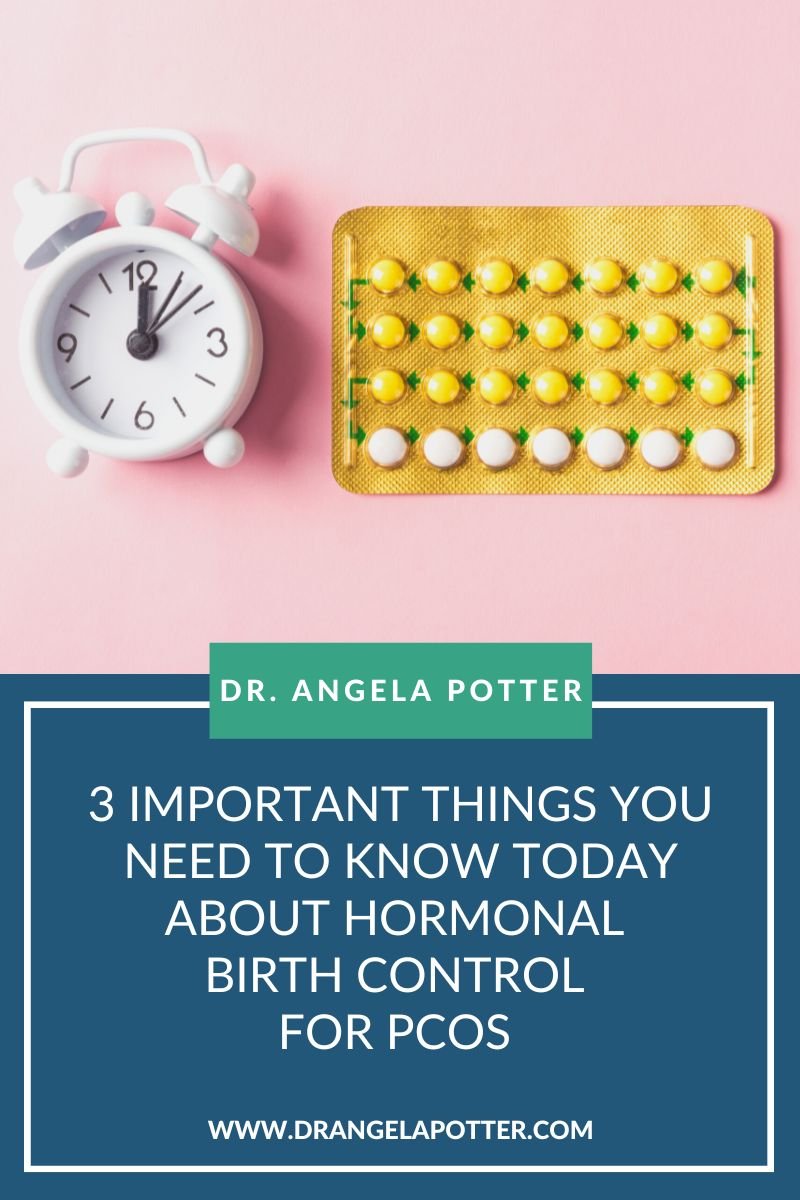Birth Control For PCOS: 3 Important Things You Need To Know if You're Trying to Get Pregnant
Birth control for PCOS is one of the most common fertility recommendations. Many doctors are giving out birth control to help women deal with the pesky issue of irregular cycles.
But (unfortunately!) using birth control to help get your cycles normal is usually causing more problems than less for PCOS.
So if you're here because your doctor tells you "you're infertile and the only way to treat your PCOS is to get back on birth control", then I'm glad you are here.
Today you're going to learn why birth control causes problems and what step you can take in order to get an effective fertility plan.
But before we start talking about what's going on with birth control, let's start with some of the basics.
What is Hormonal Birth Control?
Birth control is something that keeps you from getting pregnant. There are a wide variety of options available right now. There is birth control specific to people with female organs, and also specific to people with male organs.
When it comes to birth control for people with female organs, there are two different types. There is non-hormonal birth control and hormonal birth control.
Non-hormonal birth control includes things like barrier methods or temperature tracking.
Hormonal birth control contains hormones that stop your body from becoming fertile.
Types of Hormonal Birth Control
There are a few different types of hormonal birth control available right now:
Implant (when hormones are injected into the skin)
Hormonal IUD
The pill
Hormonal Birth Control and Irregular Cycles
Do you have a period once every 60 days? Or maybe once or twice a year? If you do, you aren’t alone. Irregular cycles are one of the hallmark symptoms of PCOS.
Right now, birth control is the top recommendation to help keep your cycles regular.
But here's today's take-away about hormonal birth control for PCOS.
Providing birth control to help regulate periods is like trying to hold up a falling bridge with a piece of dental floss.
It's ineffective and keeps your hormones from doing what they are supposed to be doing to help you get pregnant.
Let's dive in and talk about more specifics.
3 Important Things You Need to Know About Hormonal Birth Control for PCOS
Birth Control for PCOS Info #1: Hormones Aren't Regulated
There is a big misconception that hormonal birth control regulates an irregular cycle. But those hormones are actually doing the opposite. They are shutting down your body's own production of estrogen and progesterone.
Let's back up a minute. In a monthly cycle there are a variety of hormones involved. The two main hormones are estrogen and progesterone. Estrogen is the dominant hormone in the first half of the cycle. And progesterone is the dominant hormone in the second half of the cycle.
When those two hormones are balanced? That sets the body up for optimal fertility.
Hormonal birth control contains high levels of both synthetic or "fake" estrogen and progesterone. The high levels of synthetic hormones then shuts down your body's own hormone production.
Yes, the pill contains a type of estrogen and a type of progesterone. But their main job is to shut down your body's hormones, rather than improve it's ability to create fertility-specific hormones.
This also keeps your uterine lining thin and can set you up for estrogen-dominance (another issue that can keep you from getting pregnant).
So when someone tells you that the first thing to help irregular cycles is to go on the pill, you now know that you need to keep looking for other options.
Birth Control for PCOS Info #2: Not a Real Period
Now that you know what the hormones in birth control are doing, this next piece of info is not going to surprise you.
That small bleed you experience? It's not a real period. It's just a withdrawal bleed.
That bleeding starts when there is a drop in hormones. Your body will do this if you have a natural drop in hormones, or a drop of your synthetic hormones in birth control.
When you're taking hormonal birth control those hormones will drop once a month which creates the withdrawal bleed. It's usually pretty light because the hormones in birth control keep your uterine lining pretty thin.
So if you're taking hormonal birth control and you see a bleed once a month, don't be led to think that you're having regular cycles, because you (most likely) aren't. The only way to know if you have regular or irregular cycles is to see what your body is doing without hormonal birth control.
Birth Control for PCOS Info #3: Nutrient Deficiencies
Would you be surprised if I told you that the pill depletes more nutrients than any other medication? And unfortunately it depletes key nutrients that are necessary for fertility.
These are some of the top nutrients that the pill drains from your body:
B vitamins including the essential fertility B-vitamin, folate
Vitamin C
Vitamin E
Magnesium
Selenium
Zinc
DHEA
CoQ10
Eeek! This whole list contains nutrients that are vital to help improve egg quality and balance hormones to help you have optimal fertility.
Let's take CoQ10 for example.
CoQ10 is one of the most important nutrients for your mitochondria. Mitochondria are tiny parts of your cells that create massive amounts of energy. The mitochondria in your eggs are helping them have the energy they need to become mature eggs in order to ovulate and help you make a baby.
And did you know that your egg holds the highest amount of mitochondria in the entire body?
Just one single egg can hold up to 100 million of these mitochondria!
So if your mitochondria are deficient in CoQ10 (or any of the other nutrients they need), then your eggs won't have the energy they need to develop into mature, healthy eggs ready to ovulate and make you a baby.
Do you see how that works?
So if you've been on the pill recently and now you've stopped in order to get pregnant, or you're following doctors orders to help regulate your irregular periods, then replenishing your body with these nutrients is going to be an important step to help improve your fertility.
Summary
When you're taking hormonal birth control to help make your cycles more regular to improve your fertility, here are the 3 most important things you need to know:
The hormones in birth control shut down your body's own natural hormone production rather than balancing them.
The bleed you get while taking hormonal birth control is not a sign that your hormones are balanced, it's just a withdrawal bleed from the switch of hormones in the pill.
The pill depletes fertility-specific nutrients that help with hormone balance and egg quality.
If you're stuck getting dismissive advice like "you're infertile and the only way to treat your PCOS is to go back on birth control", then it's time for a different approach.



